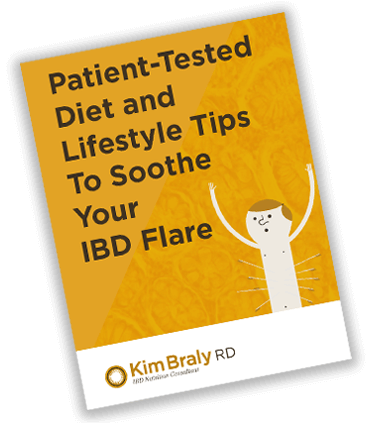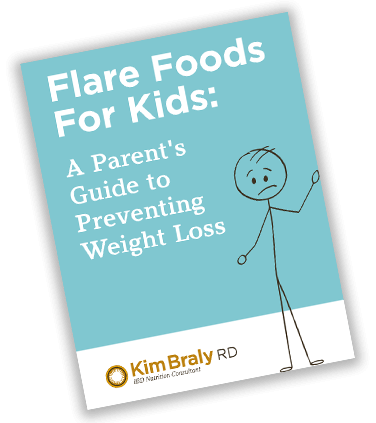
"The current research on IBD overturns years of established thinking. We now know that the foods you eat DO play a role in your IBD. This is great news for IBD patients and their families, because therapeutic diets add another proven treatment to our toolkit."
What is Dietary Therapy?
In a nutshell, dietary therapy for Inflammatory Bowel Disease (IBD) is a way of alleviating symptoms and inducing remission using specific nutrient dense foods and excluding certain other foods. There are an increasing number of different dietary therapies with growing bodies of research to support them. While we haven’t proven exactly why they work, the evidence suggests that they do work for many patients.
For many individuals, dietary therapy is a critical piece of a treatment protocol that may also involve medication. For others, dietary therapy can work on its own. And for some, dietary therapy may not work as part of their therapy regimen.
What is the Theory Behind Dietary Therapy?
We know that the development of Inflammatory Bowel Disease, including Crohn's Disease and Ulcerative Colitis, is complex. It involves the interplay between many factors, including a person’s microbiome (gut microbes), their immune system, their genes, and their environment. In the past, experts did not consider diet to play a role in IBD, but evolving research is showing otherwise.
Studies on therapeutic diets for IBD suggest that specific changes in diet can promote healing by reducing inflammation. The exact mechanism of how this works is still unclear, but researchers think that the anti-inflammatory effect may arise when the diet alters a person’s microbiome.
Since both the painful symptoms of IBD and the progression of the disease are driven by inflammation, reducing inflammation with therapeutic diets can alleviate symptoms and even induce remission for some individuals.
Reduce Inflammation
Alter the Microbiome
Alleviate IBD Symptoms
Broaden Tolerated Foods
Improve Nutritional Status
Induce or Maintain Remission
Are you ready for a nutrition solution for you or your patients?
The Development of Nutrition Therapy for IBD
The most well-established exclusion dietary therapy for pediatric Crohn’s Disease (CD) is exclusive enteral nutrition (EEN) (Konstantinos, G et al). Patients on EEN consume liquid formula-based supplements as their sole nutrient source for an average period of 8 weeks. This dietary therapy has been found to induce disease remission in pediatric patients (Lee, D et al) and the evidence is clear. It produces a similar remission rate to patients on corticosteroids, with better intestinal healing (Borrelli, O et al). EEN has been used for over a decade as a primary means of disease treatment in Europe. These same results have not been found for adults, and researchers think this may be because the liquid diet is challenging for adults to adhere to.
Since the establishment of EEN as nutrition therapy for IBD, researchers have built a body of evidence supporting the use of several different therapeutic diets. These diets share some commonalities in the foods they eliminate, but they differ widely in other respects.
Currently, some of the better-known therapeutic diets in the literature include the specific carbohydrate diet (SCD), the modified SCD, the Anti-inflammatory diet for IBD (IBD-AID), the Auto-Immune Protocol Diet (AIP) and the Crohn’s Disease Exclusion Diet (CDED). Each of these therapies is backed by varying types of research and participant numbers. For more in-depth information on these various therapeutic diets, this site is an excellent resource.
Dietary therapy is best supported by a multidisciplinary team including GI doctor, trained dietitian, and mental health provider.

"Exclusion diets have clearly demonstrated efficacy [in the treatment of IBD]."
Dr. Dale Lee
Attending Gastroenterologist Seattle Children’s Hospital/University of Washington
2019 IBD Symposium, SCH
Which Dietary Therapy is the Best?
Each person is unique. Compared to another person with IBD, you have different genetics, a different microbiome composition, a different disease type, a different environment, and your own lifestyle and preferences. In my experience using diet as a therapy for patients with IBD, even two individuals who seem similar will respond quite differently to a given therapy. This is why each person needs an individualized option, such as my 3D-Dietary® Approach, which helps them select the appropriate dietary therapy, modify it to their specific triggers and nutritional requirement, and adapt it to fit comfortably into their daily life and treatment plan.
Your proven, customized IBD dietary therapy.
"I'm always looking for the best fit for my patients, one that balances their full treatment in terms of their disease, their symptoms and their quality of life."
Kim Braly, RD
Can I See the Research?
Absolutely! Here is a partial list of research I have been involved with on the effectiveness of dietary therapies for IBD. If you have questions about what these articles mean or whether dietary therapy might be right for your situation, please contact me and I'd be happy to help
Clinical Trial: SCD & Crohn’s Disease
Suskind DL et al. The Specific Carbohydrate Diet and Diet Modification as Induction Therapy for Pediatric Crohn’s Disease: A Randomized Diet Controlled Trial. Nutrients. 2020; 12(12):3749. https://doi.org/10.3390/nu12123749
Clinical Trial: Ulcerative Colitis & Crohn’s Disease
Personalized research on diet in Ulcerative Colitis and Crohn’s disease (PRODUCE). NCT03301311. In Progress.
Digestive Diseases and Sciences
Suskind D, et al. Patients perceive clinical benefit with the specific carbohydrate diet for Inflammatory Bowel Disease. Dig Dis Sci. 2016;61(11):3255-3260.
Journal of Clinical Gastroenterology
Suskind D, et al. Clinical and fecal microbial changes with diet therapy in active Inflammatory Bowel Disease. J Clin Gastroenterol. 2018;52(2):155-163.
Journal of Pediatric Gastroenterology & Nutrition
Braly K, et al. Nutritional adequacy of the specific carbohydrate diet in pediatric inflammatory bowel disease. Journal of pediatric gastroenterology and nutrition. 2017;65(5):533-538.
Journal of Pediatric Gastroenterology & Nutrition
Hengqi, BZ et al. Dietary therapy in conjunction with immunosuppression to treat gastrointestinal Graft- versus-Host disease. Journal of pediatric gastroenterology and nutrition. 2018;69(1):e20-22.
Journal of Pediatric Gastroenterology & Nutrition
Suskind DL, et al. Clinical remission and normalization of laboratory studies in a patient with Ulcerative Colitis and Primary Sclerosing Cholangitis using dietary therapy. Journal of pediatric gastroenterology and nutrition. 2018;67(1):e15-e18.
Nutrition
Obih C, et al. Specific carbohydrate diet for pediatric inflammatory bowel disease in clinical practice within an academic IBD center. Nutrition; 2016;32(4):418-25.
Practical Gastroenterology
Chitnavis M, Braly K. The specific carbohydrate diet in inflammatory bowel disease: The evidence and execution. Practical gastroenterology. 2019;43(8):28-34.
Frequently Asked Questions about Dietary Therapy
The answer to this question is not straight forward and depends on many factors. What is your disease type, location and severity? Are there other complications such as fistulas, strictures or abscesses? Are you or your child in the hospital? Some of the answers to these questions may indicate that diet could be an excellent next step, other answers might indicate that one needs to start medication or needs a more immediate intervention than diet.
In addition to disease type and severity, it is important to evaluate other aspects. I always say to my patients that “a working therapy (whether medication or diet) has to work from a quality of life, symptom and disease perspective. If it is not working for one of these aspects, it may not be the right therapy for that individual." You or your child have to be willing to try diet modification and elimination. We find that selective or “picky” eaters who LOVE their traditional diet may struggle with a diet like the specific carbohydrate diet (SCD) and thrive with a therapy such as exclusive enteral nutrition (EEN). It is important to understand the various dietary therapies available.
In my personal experience I have seen patients successfully wean off of their medication and manage inflammation with diet alone. I have also seen the reverse where inflammation returns as medication is weaned. With some medications, the concern is that it will no longer be a viable medication option once weaned as the body can built antibodies to the medication. This would mean a potential new medication therapy if inflammation returned and antibodies were created. It is very important to partner with a GI doctor who is willing to monitor and support these medication changes.
Diet therapy is not necessarily forever but treating your inflammation IS. The goal with most of the elimination diets out there is to be a starting point that can be expanded upon over time. Inflammatory bowel disease is a life-long inflammatory condition that requires treatment. If left untreated, inflammation can wreak havoc. We tell patients that a therapy is not forever (whether diet or medication). If it is not working, there are new therapy options being researched as we speak. Some individuals love dietary therapy during one stage of life, but struggle with it during another. An example of this is grade school aged children transitioning to teenage years and wanting the freedoms that come with going out with friends independently.
We cannot speak for your specific provider, but we know many believe that there is not enough data or evidence to substantiate elimination diets (aside from EEN which DOES have the larger studies and data). Most studies are limited to one center with small population sizes. This is changing, however, as larger, multi-center studies are developed and executed.
Additionally, many practitioners do not have practice and training implementing a diet therapy and therefore, do not have the experience to see patients in remission through diet.
Find your team! IBD impacts all aspects of life and inflammation can be triggered through the environment, stress, and/or diet. A multidisciplinary team is crucial. I highly recommend in addition to your GI provider and dietitian trained in diet therapy/ies, that you also involve a mental health provider specialized in GI disorders and/or specialized diets used in treating disease. You or your child will run up against the real struggles of eating out, holiday gatherings and celebrations that you will have to navigate.
Prepare in advance to transition to the diet and have a plan in place to execute it. Some dietary therapies require re-stocking your pantry and thinking of a new way of cooking. If you like details, it is important to discuss the big picture so you know where you are beginning and the end goal. Ensure your child is involved in the decision-making process as much as possible.
FOR PATIENTS

Flares Happen!
You can't always put your life on hold when IBD rears its head, but you can make this your easiest flare yet. My proven diet and lifestyle tips support your gut, body, mind & emotions for a faster recovery and a longer remission.
FOR PARENTS

Is Your Child’s Weight Dropping Fast?
You don't have to stand helpless during an IBD flare. Feed your child foods proven to minimize triggers, calm inflammation, and repair the gut. Get them healing and growing!




